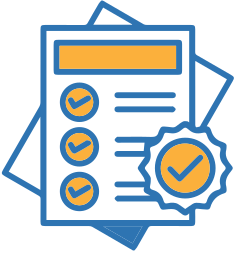Improve Marketing and Sales Efforts by Implementing a CRM Solution
The success of your marketing and sales strategies depends heavily on the understanding you have of your target audience. If you don’t understand the needs, wants, goals, and challenges of your customers, the ability to reach them and engage with them will be difficult, to say the least. Fortunately, there’s a lot of data available that can provide you with valuable insight into your customers and prospects via forms, reviews, comments, feedback, and through their online behaviors and actions.
All of this data is sourced from multiple channels and interactions, making it difficult to organize, manage, and analyze. It’s why every business, both big and small, should implement a CRM (customer relationship management) solution to organize these information sources in one centralized location. A CRM solution is the centralized hub to manage all information on your customers and prospects.
The Benefits Of Implementing A CRM Solution
A good CRM will act as a hub through which all of your information flows and from which your entire company can benefit. A CRM solution allows you to organize all of a single lead or customer’s data into one profile, ensuring that everyone in your marketing, sales, and customer support departments has access to an up-to-date customer view. With that in mind, the following are some of the specific benefits of implementing a CRM solution.
Accurately Collect, Organize And Manage All Customer Data
The biggest benefit of a CRM is arguably its function as an organizational tool. The amount of data sources that you have access to is probably much more significant than you realize. Just consider all of the points at which a single customer can interact with your company. A single customer might click on one of your PPC ads, explore several of your social media pages, comment on your blog, fill out a form on your website, use your chatbot to ask a few questions, email your company, speak with a sales representative, make a purchase, and then engage with your customer support team. Each one of these interactions results in an opportunity to capture invaluable data.
A good CRM tool can be integrated with all of these different data sources to collect that customer’s data and to organize and manage it in a single customer profile. This includes conversations that the customer had with your marketing reps, sales reps, and customer service reps, even if they were over the phone. A CRM solution allows you to track the entire history of a single prospect or customer’s engagement with your company.
Improve Sales And Marketing Alignment
By encouraging and enabling your marketing and sales teams to work together, you will find that your sales and marketing strategies will become more cost-effective. As long as you have a marketing and sales SLA (service level agreement) in place, a CRM will greatly enhance collaboration.
Besides ensuring that everyone has access to up-to-date prospect and customer information, a CRM solution allows you to implement a lead qualification process using qualification thresholds defined by the collaboration of your marketing and sales teams. This helps marketing personnel more readily identify qualified leads, while sales personnel will be able to identify sales opportunities. CRMs also allow for more effective and transparent reporting and dashboards, enabling marketing and sales teams to track and monitor their performances and to work together towards the same goals.
Improve Sales Enablement
Up-to-date customer profiles that are easy for your sales team to access enhances their ability to engage with prospects significantly. This is because they will be able to identify their pain points and interests quickly, ensuring that when they do engage that they will do so in a relevant manner. In fact, a CRM not only allows sales personnel to effectively nurture their prospects, but it also allows them to identify possible upselling and cross-selling opportunities, potentially increasing your revenue while also improving the customer experience.
Without a CRM, sales personnel won’t just have issues engaging with prospects successfully, they’ll also find it challenging to identify when a prospect is signaling that they are ready to be engaged with. Timing is everything when it comes to sales. A CRM can help identify when prospects are ready to engage as well as automatically send notifications reminding your sales team to follow up with certain prospects. Finally, a CRM can also store relevant documents, contracts, literature, and job aids that sales teams can use to nurture their prospects.
Improve Customer Service
One of the most frustrating things that customers experience is having to speak with multiple customer support representatives over a long period of time to address their issues. In some cases, it may take a little time to solve a problem. However, the frustration typically occurs when the customer has to repeat their problem and all of the relevant information to each customer support rep they speak with before they can be helped.
A CRM solution allows your customer support team to pull up the past interactions of every customer so that they can be up to speed the moment that they engage with them, thereby ensuring faster and better customer service. The use of a CRM also allows you to set up automatic follow up reminders to further enhance the customer experience.
Improve Reporting And Forecasting
The implementation of a CRM that’s properly integrated with all of your data sources will help to eliminate data silos and help to ensure that your data is complete and accurate. As a result, reporting and forecasting becomes greatly improved. You’ll be able to judge the performance of your marketing and sales results more effectively, while also being able to forecast trends with greater accuracy. Both of these improvements will lead to the ability to make informed business decisions with confidence.
Improve Sales Management
Sales management is a necessary component of any sales strategy if you want to be able to track performance and make improvements. Because a CRM collects and organizes important sales data, your sales team will be able to run processes to manage their sales contacts, pipelines, and deals. It will also be easier to evaluate the performance of individual sales reps and to track their goals and productivity. None of this is possible if your sales data is scattered, entered haphazardly, or is unorganized.
Prevent customer churn and improve customer marketing
Because CRMs make it easy to keep customer profiles updated, it also becomes much easier to identify customers who haven’t engaged (or been engaged) with your business in an amount of time that might be concerning. You can even set up automated reminders notifying your marketing team that they need to re-engage with a customer or prospect after a certain amount of time has passed. This allows you to potentially re-engage before it’s too late, thereby helping keep your brand at the top of mind and to prevent customer churn from occurring.
Improve Productivity And Efficiency
Data entry can be very time-consuming. CRMs allow you to automate certain data entry tasks, which means that your sales, marketing, and customer support teams can spend their valuable time on more pressing matters. For example, when a lead first converts, a CRM can automatically generate a new profile for that lead. You can also automate the logging of calls and other direct interactions with your company. The amount of time you save on data entry will help improve efficiency and productivity throughout your organization.
Enable Segmentation And Personalization
Personalization allows your marketing team to engage with prospects with greater success, thereby generating more interest while also increasing trust. The most effective way to personalize interactions is by using segmentation to organize similar prospects and customer profiles into lists. Then you can more easily send them relevant content at the right time. Accurate segmentation, however, isn’t possible without organized data. A CRM will enable your team to effectively segment your prospect and customer lists.
Choosing The Right CRM Solution For Your Business
Finding the right CRM solution can be tricky. Not only are there countless vendors out there who have CRM solutions available, but these vendors often offer different types of CRM solutions, such as tiered solutions, industry-specific solutions, custom solutions, and solutions specifically designed with marketing, sales, or customer support teams in mind. Find a CRM solution that meets your organization’s specific needs by comparing different solutions from different vendors to identify what your options are and whether they meet your needs. Here are a few tips to help you compare CRM options to find the right solution for you.
Choose A Scalable Solution
As your business grows, the amount of data that you’ll be collecting, organizing, and analyzing will grow as well. If your CRM isn’t capable of scaling with your organization, you’ll discover that your CRM will end up impeding your growth instead of enabling it. One answer for this is a cloud-based SaaS solution. This is the more realistic option for smaller businesses anyway since the other option is to physically host the software on-premises, which will require you to have direct access to the servers. The hardware and software you own can, therefore, limit the ability to scale unless you upgrade both.
With a SaaS-based CRM solution, you’ll either pay for the features you’ve chosen in a bespoke model or you’ll pay for a tiered solution in a subscription model. As your business grows, you can easily upgrade your subscription to enable your CRM to scale to your needs.
Look For A Vendor That Offers Training And Support
A CRM packed with functionality and features is only useful if your teams know how to use it. Since online tutorials will only help you so much, find a vendor that can provide personalized training sessions for your team. The better trained and educated your marketing, sales, and customer support teams are, the easier it will be for them to adopt the CRM and to leverage it to their advantage. Make sure that the vendor also offers dedicated customer support that can address questions and issues as they come up in a timely fashion across multiple channels.
Consider What Features And Functionality You Need
Different CRMs have different features and functionality available, often dependent on the various tiers. Before you begin comparing solutions, think about what your needs are. Your processes will be unique to your company, and you don’t want to just settle for a one-size-fits-all solution. It also helps to know what features you don’t need. If you’re investing in a bespoke solution, there’s no point in paying for features you won’t use. It also helps you determine if you should invest in a higher-level tier as well.
Some of the features and functionality you may want to consider include contact management capabilities, opportunity management capabilities, report and dashboard features and customization options, sales analytics, mobile functionality, automation features, sales forecasting capabilities, and more.
Look At Integration Capabilities
Take stock of all your data sources, including all of the different software solutions you are currently using across your organization. You will want to implement a CRM that is capable of integrating with all of these solutions. If you don’t, then you won’t be able to connect all of your data sources to your CRM, which will cause issues with the accuracy and completeness of your data and limit how effective your CRM can be. Most vendors list all of the different software solutions that their CRM is capable of integrating with.
Choose A CRM That Is Customizable
Look for a vendor that offers extensive customization. The more customizable a CRM is, the easier it will be for your organization to implement. For example, being able to customize your CRM to adapt to your processes is a lot easier than forcing your teams to change their processes in order to adapt to your CRM. The more customization is available, the more you’ll be able to tailor the CRM to your specific needs.
Request A Free Trial
The last thing you want to do is to purchase a CRM software or a CRM subscription and to spend time implementing it for company-wide use only to find that it doesn’t meet your needs in one way or another. Most vendors have free trials available, so be sure to take advantage of such an offer before you commit to a solution. Besides making sure it has the functionality and features you want, make sure that the interface is also user-friendly for your teams.
Use An Implementation Partner
Finding the right CRM solution for your business can be challenging. There are so many vendors out there and so many features and functions to consider when choosing a CRM that it can quickly become overwhelming. Working with an implementation partner can help make the process of finding and implementing the right CRM much easier. An implementation partner who has experience with a number of different CRM solutions will be able to help you identify your organization’s CRM needs and to present you with the most suitable options to choose from.
A good implementation partner can also use their experience to educate you about your CRM options as well as provide general guidance based on the various scenarios that they have encountered working with CRMs in the past. By working with an implementation partner, you’ll ensure that the right CRM solution is properly implemented, and avoid rework by setting yourself up for success from the outset.
Invest In Your CRM Implementation For Lasting Results
Implementing a CRM can have an enormous impact on the effectiveness and efficiency of your marketing, sales, and customer support strategies. You will quickly discover that your ability to nurture and maintain customer relationships will improve dramatically. However, implementing a CRM successfully will require that you choose the right CRM solution. Otherwise, problems could arise after implementation resulting in a less than optimal environment that will prevent complete adoption in your organization, and limit the CRM’s impact. Having an implementation partner that can help identify your organization’s needs and find the most suitable CRM options to address those needs can be significantly beneficial.















